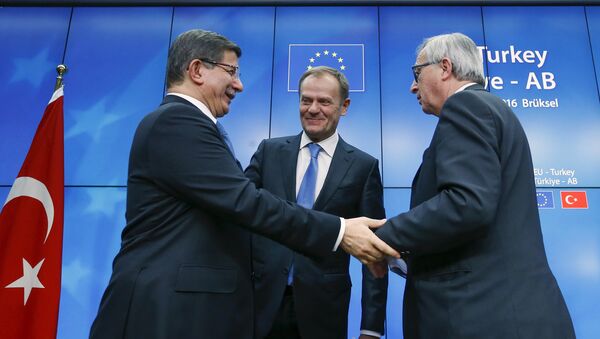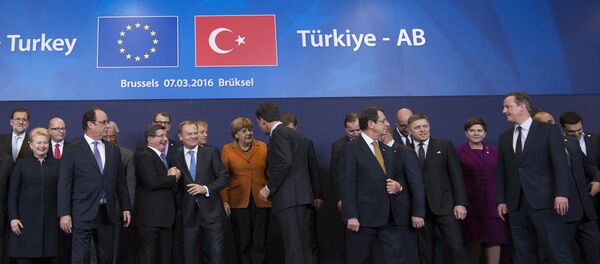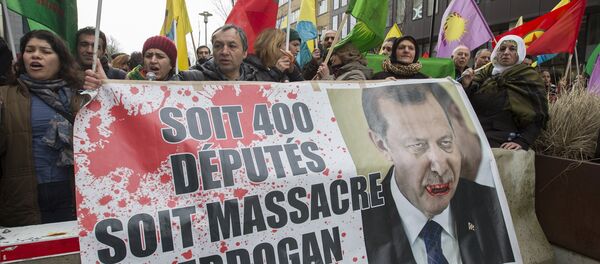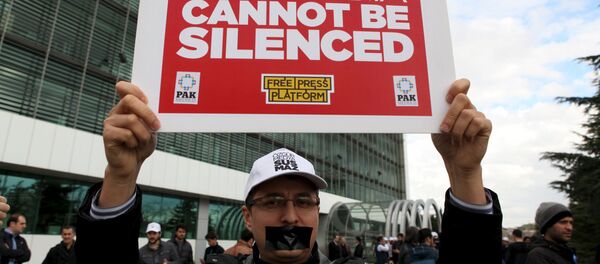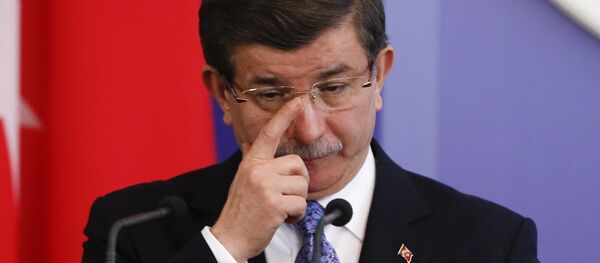The leaders of Europe and Turkish Prime Minister Ahmet Davutoglu have agreed on a new migration plan, its six principles set to put an end to the illegal immigration to the European Union from the Middle East via Turkey and the Balkans.
.@JunckerEU #EUCO "Agreement in principle w/ Turkey on #RefugeeCrisis is a game changer. It is a legally sound deal" pic.twitter.com/M4fFpGg0JZ
— Mina Andreeva (@Mina_Andreeva) 8 марта 2016 г.
— Volkan Bozkir (@volkan_bozkir) 7 марта 2016 г.
But not everyone was quite so jubilant over the whole affair. Compelled to write an op-ed for Britain's The Guardian newspaper, journalist Paul Mason laid his cards on the table and said that he was "sickened," frankly, by "the sight of Europe's leaders kowtowing" to Erdogan, adding that promises to renew negotiations on Turkey joining the EU may end up creating an existential crisis for the supranational bloc, given the values it claims to represent.
Tusk and Juncker intently study notes as new mate Davutoglu explains why Turkish journalists are criminals pic.twitter.com/dnWVskw7cB
— Matthew Holehouse (@mattholehouse) 8 марта 2016 г.
Turkey, Mason recalled, "is waging war on an ethnic minority, its riot police just stormed the offices of a major newspaper, its secret service faces allegations of arming ISIS, its military shot down a Russian bomber – and yet Turkey wants to join the European Union. The country's swift decision into despotism poses yet another existential problem for the West."
"The sight of Europe's leaders kowtowing to Turkey's president, Recep Tayyip Erdogan, in the hope he would switch off the flood of refugees to Greece, was sickening," the journalist bluntly noted.
"After the Turkish courts authorized police to seize the Zaman newspaper, tear-gassing its employees and sacking the editors, the new bosses immediately placed Erdogan's smiling picture on the front page. He has a lot to smile about."
Zaman, killed on Friday, wakes up on Sunday as a pro-government zombie pic.twitter.com/E7dqotT3CS
— Piotr Zalewski (@p_zalewski) 6 марта 2016 г.
"But it has all gone wrong," Mason lamented. "The revolts that swept Turkey's cities in June 2013 were triggered by the inability of Erdogan and his old-man's form of Islam to tolerate the basic microfreedoms that the younger generation want: the right to drink alcohol on campus, the right to uncensored social media, the right to protest peacefully about the same thing European kids protest about."
"Since then, Erdogan has overcome all obstacles. The protest was suppressed by the simple method of firing US-made tear gas canisters into the crowd and laying waste to the urban areas of the Kurdish minority, who had joined the struggle. Then Erdogan got himself made president. And having narrowly lost his parliamentary majority in June 2015, he regained it late last year after a campaign that left the offices of the pro-Kurdish HDP party burned out in several cities."
However, the journalist warned, "all this is nothing compared to the strength of the hand Erdogan has yet to play. With failed or failing states now in Afghanistan, Yemen, Iraq and Syria, the more Turkish democracy fails, the more the West has to support him. And the more the European Commission, in particular, hangs on to the conceit that Turkey will one day join the EU, the more it strengthens forces in Europe who want to leave the union altogether."
"Transcripts leaked to a Greek website last month appeared to show Erdogan overtly threatening Europe with an uncontrolled flood of refugees unless he was given money and rapid accession to the EU."
And while Mason oddly suggested that the transcripts may have been produced by "Erdogan's newest enemy, the Russian secret service," the basic truths that they reveal, he noted, are undeniable: "Real or fabricated, the tragedy is that they cannot be far from the truth: Europe is already turning a blind eye to the erosion of democracy, to collusion with people traffickers, and to military action against civilians."
Subsequently, the journalist noted, those in Europe who truly care about ideals including democracy and human rights must be willing to put European officials and national governments' feet to the fire.
"What happens next must be done calmly and proportionately. The citizens of the EU have a right, first of all, to demand honesty from their own governments, and the [European Commission] itself. The EC's 'progress report' in November was an exercise in hypocrisy: while noting the slide to despotism, censorship and brutality, the report praised Turkey for its economic progress. Imagine what the same rapporteurs might have made of an accession request by Mussolini's Italy."
"The answer must clearly be no – and once Erdogan is told so, the EU has a duty to offer a programme of support to the secular democratic forces that need to come to power in order for accession talks to be resumed…That would leave Erdogan in strategic trouble. But it would not immediately solve the situation in the Aegean. It would require Europe to double-down on its strategic commitment to Greece, with border forces, debt relief, aid and solidarity."
Ultimately, Mason notes, "to those in Europe wishing to demonstrate to a wavering Britain why we need the EU, there could not be a better opportunity." Unfortunately, such a prospect "will be viewed with dismay by the centrist political class that helped create this mess. It will bring them face to face with a choice they do not want to make: democratic values over market logic; moral decisiveness over the illusion that everything will be all right."

